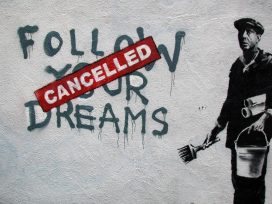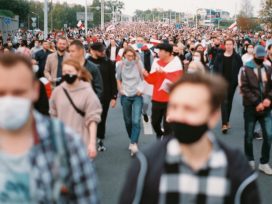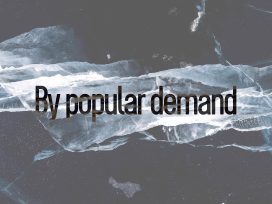Next year will be tough. Calendar cycles don’t solve anything. We need to tackle multiple crises and come to terms with our losses, both personal and social. Yet overcoming is always rooted in the firm belief that something else is possible. And not only that: it’s also ours to make.
2020 has undoubtedly been a year of crises, but festive habits notwithstanding we’ll avoid silver linings for now.

Photo by Corina Rainer on Unsplash
It is hard to fathom the magnitude of incompetence and neglect that have led to a respiratory disease’s global spread, despite the accumulated knowledge from earlier epidemics and the dedication of professionals on the frontlines. But there are other, ongoing crises that have been put aside for way too long. Humanity needs to tackle them, and soon, to avoid further damage.
The ecological collapse is rooted in colonial heritage and has been warned about for four decades now. The housing crisis, worsened by the pandemic, has been raging for the past dozen years. Gender inequality and the injury racialized and other marginalized people suffer through discrimination, exclusion and persecution date back millennia, prompting some to even suggest they are part of human nature.
We like to believe otherwise.
But instead of fake cheer, we’re recommending a selection of articles chosen by members of the Eurozine staff that reflect on our current moment. Even if the authors don’t have any readymade solutions, they propose a systemic understanding of our problems, a prerequisite for finding ways out of our current calamities. In consumer societies, it is unusual to lack definite answers, yet it is the only honest way we can get on the right track.
Next year will be tough. Calendar cycles don’t solve anything. We need to overcome grave democracy failures, health and environmental threats, historical inequality and the reluctance to change for a common goal. And we must come to terms with our losses, both personal and social.Yet overcoming is always rooted in the firm belief that something else is possible. And not only that: it’s also ours to make.
Among all the hardship of 2020, I am proud to see how the Eurozine network and our Vienna-based team stood the test of this trying time. The Eurozine network of cultural journals is built on mutual understanding, cooperation and support, values that are crucially important now. We have managed to expand our publishing and readership and have held an online conference. And we hope to meet as a network in Budapest next year!
Above all, thank you, dear readers, for your interest in Eurozine and your growing support through these times. We wish you a much better new year, one that we’ll proudly look back on next December to see how far we’ve come from the Cape of Hopelessness. Until then, let’s hold out and dare to face the impossible tasks ahead.
So, as a token of our dedication, here are some of the Eurozine Team’s personal favourites from this year’s publishing.
By popular demand
Our favourites from 2020
And some music for desperate times and trying nevertheless:
This editorial is part of our 24/2020 newsletter. Subscribe to get the weekly updates about our latest publications and reviews of our partner journals.
Published 29 December 2020
Original in English
First published by Eurozine
© Eurozine
PDF/PRINTNewsletter
Subscribe to know what’s worth thinking about.
Related Articles

Literature can’t save the world, but it does provide insight into the behaviour that drives cultural trends. And given the anthropocenic tendency towards self-destruction, we need all the help we can get with cultivating solidarity, combating injustice and resisting censorship.

Trump returns to the White House at a time when the global stakes are higher than ever. What can be expected from his unpredictable foreign policy, and what does this mean for international solidarity, geopolitical stability and democratic values?










